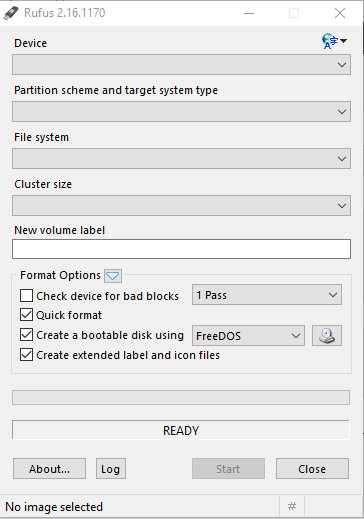
- #Create windows 10 bootable usb with rufus how to
- #Create windows 10 bootable usb with rufus install
- #Create windows 10 bootable usb with rufus windows 10
- #Create windows 10 bootable usb with rufus software
If you are searching for an easy-to-use tool to create bootable USB drives, then Etcher might be the best pick for you. YUMI is supported on Windows 10, Windows 8.1, Windows XP, Windows 7, and Windows Vista. Unlike all others, YUMI is not only limited to the creation of bootable USB drives it can even create bootable USB rescue disk and can be used for disk cloning as well. YUMI, also know as Your Universal Multiboot Installer, is another best tool to create Bootable USB drives. Compared to all other USB Media creation tools, Universal USB Installer is pretty easy to use.
#Create windows 10 bootable usb with rufus install
To create a Linux-based bootable USB drive with Universal USB Installer, pick a Live Linux distro, the ISO file, your flash drive, and click on the Install button.
#Create windows 10 bootable usb with rufus windows 10
That’s it, your Windows 10 bootable USB flash drive has been created!Ĭongratulations! You have created a Windows 10 bootable USB flash drive using the Rufus software.Well, Universal USB Installer is primarily meant for Linux only, but it’s also compatible with Windows ISO files. Step 6: Wait while the bootable USB flash drive is created. Step 5: Confirm the creation of the bootable USB flash drive by clicking OK. ISO file: You already have the Windows 10 ISO: click the SELECT button and select the Windows 10.iso file on your computer.
#Create windows 10 bootable usb with rufus software
Step 2: Open the Rufus software by double-clicking on the rufus.exe file.ĭevice: Your USB stick (make sure you have selected the correct USB stick). Rufus is undoubtedly the reference software for creating bootable USB flash drives for any operating system, especially Windows. Method n☂: Create a Windows 10 Bootable USB Using Rufus software This operation takes more or less time depending on the speed of your Internet connection and the performance of the USB controller + USB flash drive.Īnd that’s it, your Windows 10 bootable USB key is ready! Step 7: The software downloads the Windows 10 installation files and then copies them to the USB flash drive. Warning: all data on your USB flash drive will be deleted.Ĭlick Next to start creating the Windows 10 bootable USB flash drive. If you check the box Use recommended options for this PC, the software will automatically select the right options for your computer. Step 4: Select the language and system architecture (in 99% of cases you will need the 64-bit version). Step 3: Select Create installation media (USB flash drive, DVD or ISO file) for another PC. Step 2: Run the MediaCreationTool.exe file and accept the terms of the license agreement.

Step 1: Download the Windows 10 media creation tool. With Microsoft’s Media Creation Tool, creating a Windows 10 bootable USB flash drive is very easy: everything is done automatically, the tool installs the Windows 10 installation files on the USB flash drive like a pro.

Method n☁: Create a Windows 10 Bootable USB Using Microsoft’s Media Creation Tool With Rufus, you can also choose the partition table (MBR or GPT) of the USB drive to install Windows 10 either in UEFI mode or in legacy BIOS mode. You keep a copy of the Windows 10 ISO to create and recreate several Windows 10 installation USB drives of your own choice.

#Create windows 10 bootable usb with rufus how to
In this tutorial, we are going to see how to create a Windows 10 bootable USB.


 0 kommentar(er)
0 kommentar(er)
